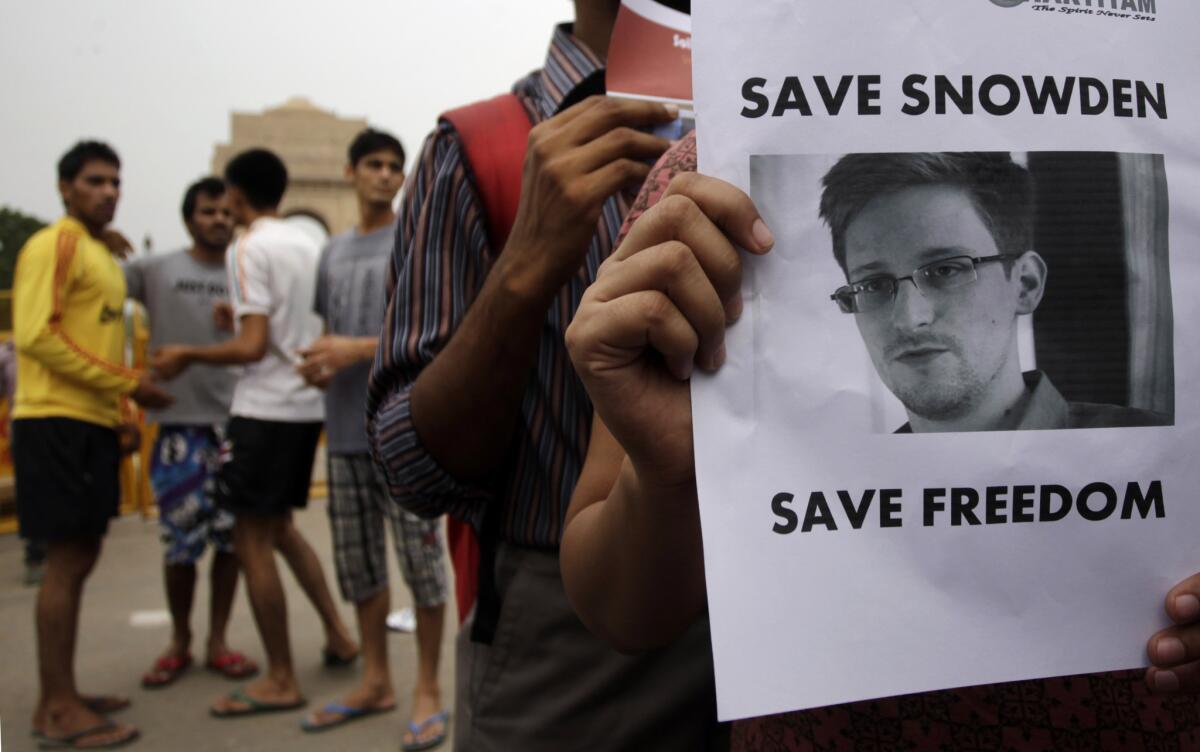Snowden should take Venezuelan asylum offer, Russian official says

An influential Russian lawmaker on Sunday advised fugitive leaker Edward Snowden to take up Venezuela’s offer of asylum, deeming it his “last chance” and cautioning that the leaker of U.S. security secrets can’t live at Moscow’s airport forever.
It was a clear sign from the Kremlin that it has tired of the international standoff over Snowden, the 30-year-old former National Security Agency contractor who disclosed classified information about widespread U.S. surveillance of worldwide telephone and Internet contacts.
“Venezuela is waiting for an answer from Snowden,” Alexei Pushkov, head of the Russian parliament’s international affairs committee, said on Twitter. “This, perhaps, is his last chance to receive political asylum.”
In a separate tweet, Pushkov noted that Snowden “shouldn’t live in Sheremetyevo,” Moscow’s main international airport where the fugitive has been stuck in a transit area for two weeks.
Snowden arrived to Moscow on a flight from Hong Kong on June 23. But his U.S. passport had been revoked after Justice Department officials brought espionage charges against him and sought his extradition. That has prevented him from proceeding through passport control and officially entering Russian territory. The airport corridors and holding areas between the arrival gates and the immigration booths staffed by border guards comprise a diplomatic no-man’s land from which an undocumented person can neither enter nor depart.
Venezuelan President Nicolas Maduro announced Friday that his country was offering “humanitarian asylum” to Snowden so that he can live without “persecution from the empire,” a reference to the United States.
On Saturday, Venezuelan Foreign Minister Elias Jaua told reporters in Caracas that his office had not yet been in contact with Russian authorities but expected to be in touch Monday.
For Snowden to leave for Caracas, diplomats at the Venezuelan Embassy in Moscow would have to provide him with travel papers before he could board flights headed for South America. There are no scheduled direct Moscow-to-Caracas flights and most connections are through the United States, Spain or other countries that would put Snowden at risk of arrest during a stopover. However, Aeroflot and Cuba’s Avianca have direct flights from Moscow to Havana, from where he could easily travel on to Caracas.
Venezuela is one of three countries that have offered asylum to Snowden. Nicaraguan President Daniel Ortega announced at the same time as Maduro his country’s willingness to take in the fugitive “if conditions allow,” and Bolivian President Evo Morales extended an offer Saturday. Morales said the move was in retaliation for European countries’ denying his plane entry to their airspace last week as he traveled back to La Paz from Moscow. Spain, Italy, France and Portugal reportedly had been informed by unknown U.S. sources that Snowden was on board Morales’ plane.
Pushkov’s comments on Twitter and in an interview with Voice of Russia radio appeared to signal the Kremlin’s desire for Snowden to move on. President Vladimir Putin last week said that Snowden was welcome to settle in Russia but only if he ceased leaking classified information that was damaging to “our American partners.” That prompted Snowden to withdraw his application for asylum in Russia.
U.S. officials are believed to have informed the countries to which Snowden directed asylum appeals -- 27 in all, according to WikiLeaks -- that sheltering the fugitive from U.S. prosecution would damage their relations with Washington and imperil trade and other mutually advantageous agreements.
Pushkov observed that Venezuela already has “a sharp conflict” with the United States and “it won’t be worse” for defying the U.S. extradition request and providing a safe haven for Snowden.
ALSO:
Syrian opposition group names new president
Britain deports radical Muslim preacher for trial in Jordan
Cabinet approves changes to Israel’s draft conscription law
More to Read
Sign up for Essential California
The most important California stories and recommendations in your inbox every morning.
You may occasionally receive promotional content from the Los Angeles Times.











